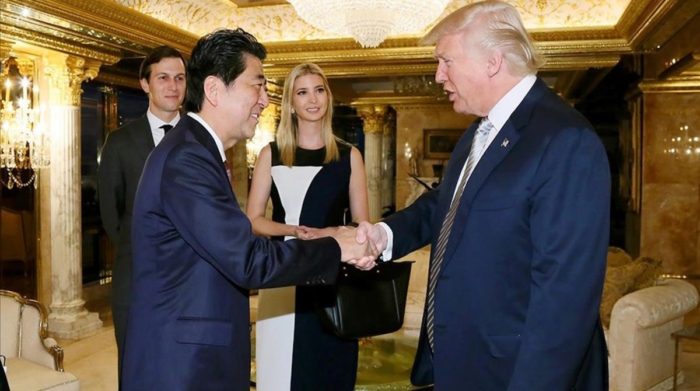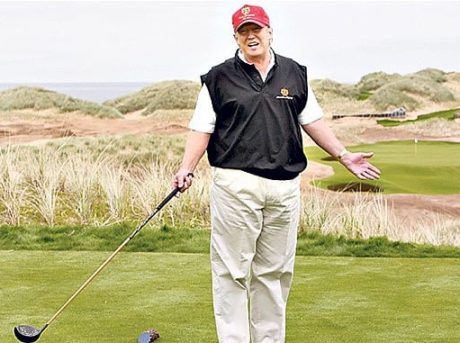Published in the Nikkei Asian Review 2/12/2016
The world still has no idea what to make of President-elect Donald Trump. Much of the media commentary has been hostile, but the response of the financial markets so far is overwhelmingly positive.
Almost from the moment it became clear that Trump, not Hillary Clinton, would be calling the shots for the next four years, the U.S. dollar has soared, yield curves have steepened and industrial metals and cyclical stocks have risen Lazarus-like from the dead.
Japan has already benefited from this resurgence of economic confidence. Prime Minister Shinzo Abe’s reflationary program ran into heavy weather when the yen appreciated from its low of 125 to the dollar in May 2015, briefly breaching the 100 level on the day of the U.S. presidential election. The Bank of Japan seemed helpless as the strong currency sliced into corporate profits, battered Japanese stocks and crushed inflationary expectations.
The coming of “The Donald” has changed all that. The yen has reversed course sharply, profits are bottoming and foreign investors are shovelling money back into the resurgent Tokyo stock market. If the Trump administration delivers more inflation and more growth to the world, as investors appear to be betting, that would be manna from heaven for Japan, the country which has struggled the longest with deflation.
Could the encouraging market action be an omen of what lies ahead for the wider U.S.-Japan relationship? At first sight that seems an unlikely prospect. Shinzo Abe hastily arranged a meeting with Trump in New York — making him the first foreign leader to meet the president-elect — precisely because Japanese policymakers were so concerned about the potential damage to Japanese interests.
Abe had invested a great deal of political capital in the Trans-Pacific Partnership, making it a catalyst for agricultural reform despite its unpopularity with key domestic constituencies. From the Japanese perspective, the 12-country trading bloc would have had great strategic value as a counter to growing Chinese clout in the region.
Such considerations cut no ice with Trump, who has made it clear that scrapping TPP is one of his top priorities. Trump has also questioned the value of the Japan-U.S. Security Treaty and indicated that he wants Japan to increase its already large contribution to the cost of U.S. military bases in Japan.
TRUMP’S TWO-WAY STREET
Such a transactional approach to the alliance conjures up the Japanese nightmare of American disengagement and abandonment in the face of an expansionary China. In a recent essay in The American Interest, influential historian Niall Ferguson of Harvard University described just such a scenario taking shape under a Trump-driven New World Order characterized by spheres-of-influence realpolitik.
The dominant structure, according to Ferguson, would be an “American-Chinese-Russian tripartite arrangement.” Meanwhile, “Japan and Germany would be the biggest losers, just as they were the biggest beneficiaries of the postwar international architecture designed simultaneously to disarm, constrain, and enrich them.”
Fortunately for Japan, Sino-American rapprochement is an unlikely prospect under Trump, who has surrounded himself with China hawks and has been consistently suspicious of Chinese intentions. As Trump wrote in his most recent book, Crippled America: “There are people who wish I wouldn’t refer to China as our enemy. But that’s exactly what they are. They have destroyed entire industries by utilizing low-wage workers, cost us tens of thousands of jobs, spied on our businesses, stolen our technology, and have manipulated and devalued their currency.”
In contrast, Trump’s main beef with Japan concerns the unbalanced nature of the security relationship. As he declared on the campaign trail, “If Japan is attacked, we have to use the full force and might of the United States. If we’re attacked, Japan doesn’t have to do anything. They can sit at home and watch Sony television.”
Trump’s words were typically bombastic, but the point needed making. The U.S.-Japan security relationship is not a normal alliance and neither of the two parties has acted as a normal nation. The U.S. has positioned itself as global and regional policeman, while Japan has effectively become a protectorate — all too successfully “disarmed, constrained and enriched.” If the November election signals America’s desire to return to the status of a normal nation which defines its interests in the same manner as other nations, then Japan must also return to normality — which means having the ability to defend itself, make alliances and deploy forces to protect its interests as it sees fit.
Trump is not proposing to tear up the U.S.-Japan Security Treaty. He is asking for a deal that makes better sense from the American standpoint; in other words, more reciprocity from Japan, as from allies elsewhere in the world. As he went on to say in his campaign speech, “This isn’t 40 years ago … it’s got to be a two-way street.”
Nobody understands this better than Shinzo Abe, who is a long-term advocate of a more active role for Japan in regional security and reform of its pacifist constitution. The Japanese public was never entirely convinced, but thanks to China’s marine expansionism the polls had started to tilt away from pacifism. The arrival of Trump, with his campaign soundbites about Japan needing to defend itself with its own nuclear weapons, constitutes a huge wake-up call.
Between them, Chinese President Xi Jinping and Donald Trump have made Abe’s case for him.
ABE AND THE “BAD BOYS”
Trump’s views on trade are unlikely to win endorsement from free market economists, but they have been consistent. He is not against foreign trade per se, but he distrusts trade with low-wage economies such as Mexico and China.
The Trump administration is unlikely to deploy the nuclear option of high penalty tariffs against China because China-made products are deeply embedded in the living standards of ordinary Americans. Even so, there are many other forms of sanction that might be used, such as dumping levies, rejection of takeovers on national security grounds and recourse to quotas of the kind imposed on Japanese exporters under “Super 301” authority in the 1980s.
Trump prefers bilateral deals to multilateralism and has no objection to trade with other high-wage countries. Japanese policymakers need to forget about TPP and start bilateral trade negotiations with the U.S. as soon as possible.
According to Deputy Chief Cabinet Secretary Koichi Hagiuda, “Prime Minister Abe gets along very well with ‘bad boys’ despite his upbringing.”
Presumably this refers to Abe’s generally productive relations with strongmen such as Vladimir Putin of Russia, Recep Erdogan of Turkey and India’s Narendra Modi. Now there is a new bad boy in town in the unmistakable shape of Donald Trump. Abe’s job is to convince him that Japan, not China, is the U.S.’s natural partner in any emerging new order.
There is a precedent. Amidst the trade friction of the 1980s, then-Japanese Prime Minister Yasuhiro Nakasone managed to forge a close working relationship with American President Ronald Reagan. Trump and Abe do not share the anti-Soviet beliefs that brought “Ron and Yasu” together, but there should be enough common ground on security and trade to support a constructive “Don and Shinzo” relationship. As well, of course, as golf.



